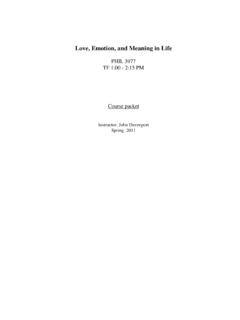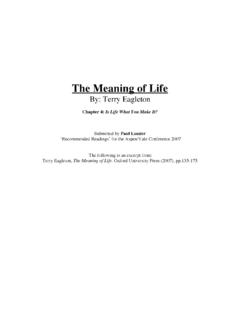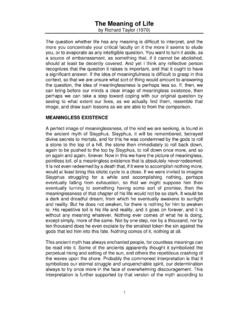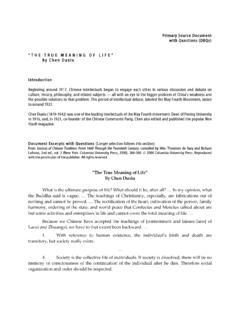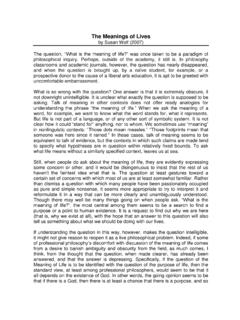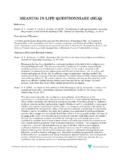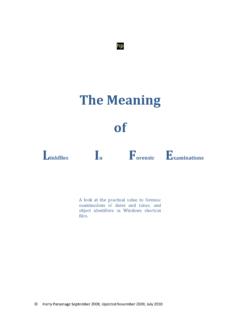Transcription of Taylor-The Meaning of Life - Philosophia
1 The Meaning of LifeRichard taylor The question whether life has any Meaning is difficult to interpret, and the more you concentrate your critical faculty on it the more it seems to elude you, or to evaporate as any intelligible question. You want to turn it aside, as a source of embarrassment, as something that, if it cannot be abolished, should at least be decently covered. And yet I think any reflective person recognizes that the question it raises is important, and that it ought to have a significant answer. If the idea of meaningfulness is difficult to grasp in this context, so that we are unsure what sort of thing would amount to answering the question, the(This essay is reproduced from Richard taylor , "The Meaning of life .)
2 " in Good and Evil Amherst, Prometheus Books. 2000. 31934. Copyright 2000 by Richard taylor . Reprinted with permission.)The Meaning of life 19idea of meaninglessness is perhaps less so. If, then, we can bring before our minds a clear image of meaningless existence, then perhaps we can take a step toward coping with our original question by seeing to what extent our lives, as we actually find them, resemble that image, and draw such lessons as we are able to from the EXISTENCEA perfect image of meaninglessness, of the kind we are seeking, is found in the ancient myth of Sisyphus. Sisyphus, it will be remembered, betrayed divine secrets to mortals, and for this he was condemned by the gods to roll a stone to the top of a hill, the stone then immediately to roll back down, again to be pushed to the top by Sisyphus, to roll down once more, and so on again and again, forever.
3 Now in this we have the picture of meaningless, pointless toil, of a meaningless existence that is absolutely never redeemed. It is not even redeemed by a death that, if it were to accomplish nothing more, would at least bring this idiotic cycle to a close. If we were invited to imagine Sisyphus struggling for a while and accomplishing nothing, perhaps eventually falling from exhaustion, so that we might suppose him then eventually turning to something having some sort of promise, then the meaninglessness of that chapter of his life would not be so stark. It would be a dark and dreadful dream, from which he eventually awakens to sunlight and reality. But he does not awaken, for there is nothing for him to awaken to.
4 His repetitive toil is his life and reality, and it goes on forever, and it is without any Meaning whatever. Nothing ever comes of what he is doing, except simply, more of the same. Not by one step, nor by a thousand, nor by ten thousand does he even expiate by the smallest token the sin against the gods that led him into this fate. Nothing comes of it, nothing at ancient myth has always enchanted people, for countless meanings can be read into it. Some of the ancients apparently thought it symbolized the perpetual rising and setting of the sun, and others the repetitious crashing of the waves upon the shore. Probably the commonest interpretation is that it symbolizes our eternal struggle and unquenchable spirit, our determination always to try once more in the face of overwhelming discouragement.
5 This interpretation is further supported by that version of the myth according to which Sisyphus was commanded to roll the stone over the hill, so that it would finally roll down the other side, but was never quite able to make am not concerned with rendering or defending any interpretation of this myth, however. I have cited it only for the one element it does unmistakably contain, namely, that of a repetitious, cyclic activity that never comes to any20 taylor thing. We could contrive other images of this that would serve just as well, and no mythmakers are needed to supply the materials of it. Thus, we can imagine two persons transporting a stone or even a precious gem, it does not matter back and forth, relay style.
6 One carries it to a near or distant point where it is received by the other; it is returned to its starting point, there to be recovered by the first, and the process is repeated over and over. Except in this relay nothing counts as winning, and nothing brings the contest to any close, each step only leads to a repetition of itself. Or we can imagine two groups of prisoners, one of them engaged in digging a prodigious hole in the ground that is no sooner finished than it is filled in again by the other group, the latter then digging a new hole that is at once filled in by the first group, and so on and on what stands out in all such pictures as oppressive and dejecting is not that the beings who enact these roles suffer any torture or pain, for it need not he assumed that they do.
7 Nor is it that their labors are great, for they are no greater than the labors commonly undertaken by most people most of the time. According to the original myth, the stone is so large that Sisyphus never quite gets it to the top and must groan under every step, so that his enormous labor is all for naught. But this is not what appalls. It is not that his great struggle comes to nothing, but that his existence itself is without Meaning . liven if we suppose, for example, that the stone is but a pebble that can be carried effortlessly, or that the holes dug by the prisoners are but small ones, not the slightest Meaning is introduced into their lives.
8 The stone that Sisyphus naves to the top of the hill, whether we think of it as large or small, still rolls hack every time, and the process is repeated forever. Nothing comes of it, and the work is simply pointless. That is the element of the myth that I wish to , it is not the fact that the labors of Sisyphus continue forever that deprives them of Meaning . It is, rather, the implication of this: that they come to nothing. The image would not be changed by our supposing him to push a different stone up every time, each to roll down again. But if we supposed that these stones, instead of rolling back to their places as if they had never been waved, were assembled at the top of the hill and there incorporated, say, in a beautiful and enduring temple, then the aspect of meaninglessness would disappear.
9 His labors would then have a point, something would come of them ill, and although one could perhaps still say it was not worth it, one could not say that the life of Sisyphus was devoid of Meaning altogether. Meaningfulness would at least have made an appearance, and we could see what it point will need remembering. But in the meantime, let us note another way in which the image of meaninglessness can be altered by making only a very light change. Let us suppose that the gods, while condemning SisyphusThe Meaning of life 21to the fate just described, at the same time, as an afterthought, waxed perversely merciful by implanting in him a strange and irrational impulse; namely, a compulsive impulse to roll stones.
10 We may if we like, to make this more graphic, suppose they accomplish this by implanting in him some substance that has this effect on his character and drives. I call this perverse, because from our point of view there is clearly no reason why anyone should have a persistent and insatiable desire to do something so pointless as that. Nevertheless, suppose that is Sisyphus' condition. He has but one obsession, which is to roll stones, and it is an obsession that is only for the moment appeased by his rolling them he no sooner gets a stone rolled to the top of the hill than he is restless to roll up it can be seen why this little afterthought of the gods, which I called perverse, was also in fact merciful.

